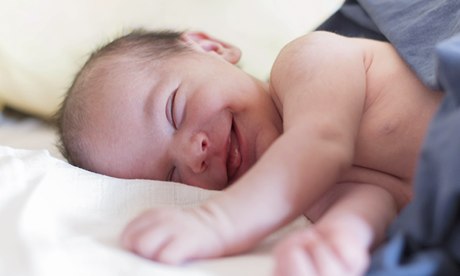
Three in four women say it is "extremely likely" they would recommend their maternity unit to friends and family, a survey by NHS England has found.
Since 1 October last year women in every NHS maternity unit in England have been asked questions under the new friends and family test (FFT), and the results from the first three months were published online on Thursday.
Women are asked up to four questions, each focusing on a different aspect of the pregnancy and birth.
The answers, relating to antenatal services, birth experiences, postnatal wards, and postnatal community services, were published separately for each month from October to December.
Asked whether they would recommend the labour ward, birthing unit or home-birth service they had used, 76.5% of the women questioned in the latest month, December, said it was "extremely likely" they would, while 17.4% said it was "likely" they would.
Less than 2% answered that they would be "extremely unlikely" or "unlikely" to do so. The remainder either said it was "neither likely nor unlikely" they would recommend the service, or answered "don't know".
Catherine Calderwood, NHS England's national clinical director for maternity and women's health, said: "The FFT is about transparency, and we know that women and their families appreciate us being open and honest, even when it hasn't been an ideal birth or experience.
"By listening to women and acting on their FFT feedback, we can and will improve things. Not just the clinical or safety issues, but the whole childbirth experience."
In all 10,001 women responded to the question about their baby's birth in December. That represented just 19.1% of the total eligible number, but NHS England said it was above its target of 15%.
A FFT score has been given for every area, trust and hospital in England for each of the four questions based on a formula that subtracts the proportion of women who responded saying they were "neither likely nor unlikely", "unlikely", or "extremely unlikely" to recommend a service, from the number of women saying they would be "extremely likely" to recommend it.
Using this formula, which can give a maximum of 100 or minimum of -100, the overall family and friends score for England for the birth question was 75 in December, albeit with wide variations.
Bath, Gloucestershire, Swindon and Wiltshire was the area team with the highest FFT score (92, with a response rate of 14.3%), while the London area team had the lowest (62, with a response rate of 15.9%).
At trust level, six had the maximum FFT score of 100% but only one of those had a response rate greater than 10%, which was Salisbury NHS foundation trust, where 29 people responded to the birth question out of 198 entitled to do so.
The Isle of Wight was the trust with the lowest score (38), although this was based on the response of only eight women of 136 who were eligible.
The next lowest was King's College hospital NHS foundation trust in London with a score of 41 based on 110 responses (a response rate of 12.1%).
Six of the bottom 12 trusts on the birth question were in London. This mirrors the results of a survey last year by the NHS regulator, the Care Quality Commission, which found that London was the area of England with the worst perceived maternity care, with six of the trusts offering mothers "consistently worse than average" care.
At the level of individual hospitals there were again wide variations, the sites with extreme scores tending to be those with low numbers of responses.
The overall FFT scores for England for the other questions were 63 for antenatal care, 66 for postnatal ward care and 74 for postnatal ward provision.
Belinda Phipps, chief executive of the parents' charity NCT, welcomed the survey but said "progress will only be possible if services act on the results".

